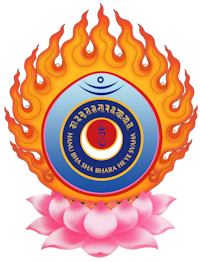Prayer Requests (Pujas)
What are pujas?
Pujas are prayer rituals that involve visualization, recitation of mantras, and offerings to Buddhas and Bodhisattvas. They are performed to receive the blessings of these awakened beings, to accumulate merit, and to remove obstacles and negative conditions for oneself and others.
Why request a puja?
In traditional Buddhist cultures, lay people request monastics to perform pujas for them in order to increase positive conditions and success in their spiritual and worldly affairs, as well as to eliminate or avert problems that may arise in these areas. The monastics’ long and deep practical experience gives the pujas great blessing and power. This mutually supportive relationship between the lay and monastic communities generates bonds of bodhicitta that benefit all beings.
How does a puja “work”?
Pujas can be sponsored to benefit oneself or others, the living or the deceased. At the center of each puja is a particular Buddha whose activity is particularly suited to fulfill certain functions – such as protection, removal of obstacles, pacification of diseases or help for the deceased.
The pujas commissioned at the Drikung Garchen Institute are performed by Drubpon Tsering Rinpoche or Drubpon Palkyi. In addition, other practitioners may also participate in the pujas.
How do I request a puja?
A puja can be ordered through our office by calling +49 89 710 485 72 or by emailing mail@garchen.de.
Is there a fee for the pujas?
We ask for a donation of €50 to support the center, plus a donation for Drubpon Tsering Rinpoche and Drubpon Palkyi at your own discretion. You can find all the information about the various donation options here.
“[Pujas] assist with the purification of negative factors, and the generation of positive, favorable conditions. I will always pray that the negative circumstances, hindrances, and obstacles of the ritual benefactors be pacified and their wishes accomplished spontaneously.”
~ H.E. Garchen Rinpoche ~
We offer pujas for the living and pujas for the deceased. Drubpon Tsering Rinpoche and Drubpon Palkyi can also advise on the most suitable puja in most cases.
PUJAS FOR THE LIVING
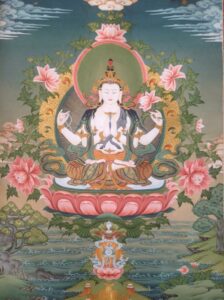
CHENREZIG
Chenrezig is the embodiment of the compassion of all Buddhas. His great compassion aims to alleviate the suffering of all beings and to guide them to ultimate awakening.
A Chenrezig puja is suitable for bringing about compassionate relief from suffering and for increasing compassion.
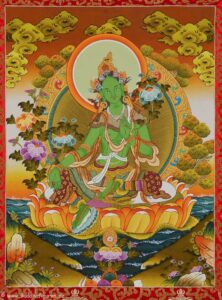
Green Tara
Green Tara is active compassion manifested in a female form. Her name means “star” in Sanskrit.
The Green Tara puja is suitable for protecting us from fears and dangers and for eliminating confusions, negative karma, and obscurations.
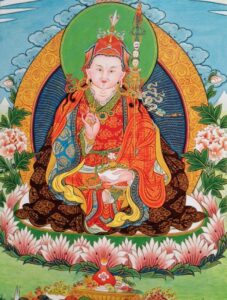
Guru Rinpoche
Guru Rinpoche is also known as Padmasambhava – “the one who is born in a lotus”. He introduced Buddhism to Tibet.
This puja is performed to remove obstacles to worldly or spiritual achievements and to avert harm from ghosts or non-human beings.
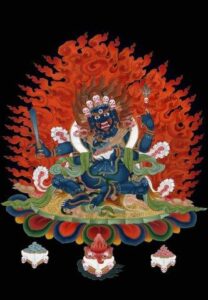
Mahakala
Mahakala is a wrathful form of Chenrezig. He is the Dharma protector of all Buddha-fields.
Mahakala is called upon to protect Dharma practitioners from delusion, to foster positive qualities, and to support the completion of Dharma practice.
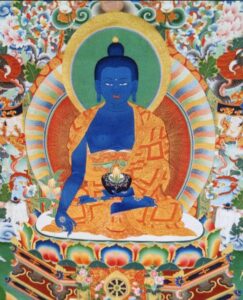
Medicine Buddha
The Medicine Buddha is also called the Supreme Healer. His blue-colored body represents omniscient wisdom and compassion as vast as boundless space.
The practice of the Medicine Buddha is a very powerful method for alleviating the suffering of illness and affliction – both for oneself and for others.
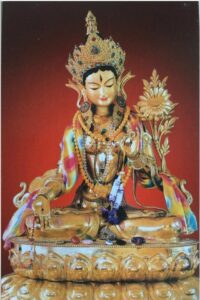
White Tara
The White Tara is the mother of all Buddhas, who bestows long life and protection on all beings. She has seven eyes, which enable her to see all beings in all realms. Her expression is deeply compassionate and peaceful.
Practicing her promotes long life, healing, and relief from all kinds of suffering – for oneself and for others.
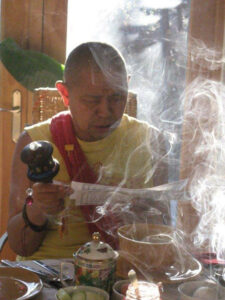
Smoke Offering
The smoke offering is the practice of making fragrant offerings of incense for the benefit of all beings in all realms, to alleviate their suffering, and to fulfill their wishes and needs. It is performed to accumulate merit, purify obstacles, and repay karmic debts.
Pujas for the Deceased

Phowa (transference of consciousness)
Phowa is the practice of the direct transference of the consciousness of the deceased into Amitabha’s Pure Land of Dewachen. In the best case, the consciousness of the deceased experiences rebirth in the Pure Land of Amitabha Buddha. Otherwise, the practice is said to help ensure a happy rebirth in the higher realms.
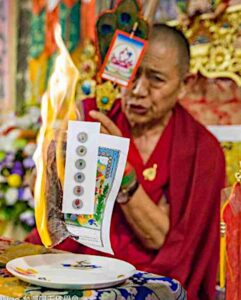
Jangchok Puja
This ritual purifies the obscurations and negative karma of the deceased. It is usually done in conjunction with another practice, such as Tara or Vajrasattva.
In this practice, the living express love for the deceased, make offerings to them, remind them of their true nature, and encourage them to turn to the Dharma. A brief Phowa is part of this practice.
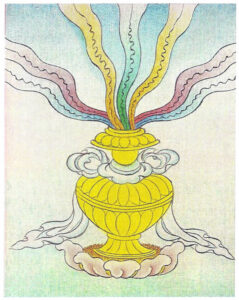
49-Day Sur Puja
In the practice of Sur, burnt offerings are made for the benefit of beings in bardo (the state between births).
This practice is performed once a day for 49 days. This is believed to be the length of time that a deceased being spends in the bardo.
The 49-day Sur practice is an excellent method for generating deep merit for the deceased and removing obstacles for them.
